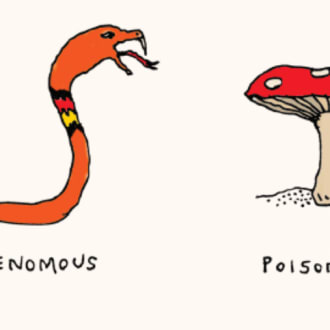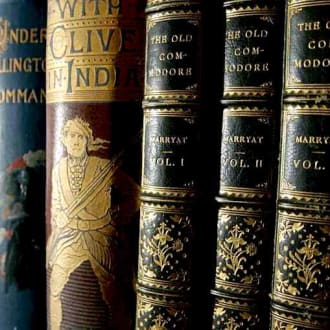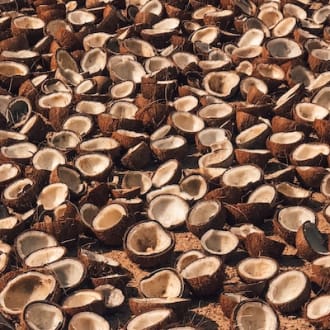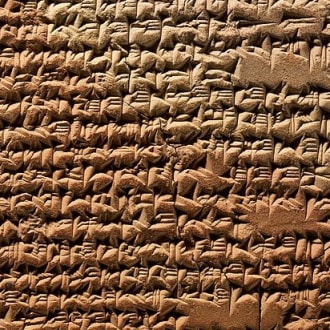The Best of Literary Hub
20+ most popular Literary Hub articles, as voted by our community.
New this Week
These are fresh off the press.
Yes, But Can You Really Explain the Difference Between Morals and Ethics?
Hermit vs. Anchorite A hermit retires from society to live alone in the wilderness. An anchorite retires from society to live in an enclosed cell attached to a church. One lives apart. The other, w…
Trending
These are currently making the rounds on Refind.
Always Rooting for the Antihero: How Three TV Shows Have Defined 21st-Century America
“An outlaw can be defined as somebody who lives outside the law, beyond the law and not necessarily against it.” –Hunter Thompson * “All human advances occur in the outlaw area.” –Buckminster Fulle…
What Is Left? Rebecca Solnit on the Perennial Divisions of the American Left
In late 1936 George Orwell, like so many young idealists from Europe and the USA, went off to fight fascism in Spain. By the spring of 1937 he realized he was in a war with not two but three sides.…
Busting Genre, in Style: Geoff Dyer on the Joy of Writing “Unpublishable” Books
George Makari, director of the DeWitt Wallace Institute of Psychiatry: History, Policy and the Arts at Weill Cornell, and author of Of Fear and Strangers: A History of Xenophobia hosts an ongoing s…
“She’s Bouncing the Ball!” On the Uncanny Way Octopuses Play
One day in 1997, psychology professor Jennifer Mather answered her phone to hear the excited voice of Roland Anderson, her collaborator in a rather unusual study of animal behavior. “She’s bouncing…
Flukes, Fakes and Statistical Uncertainties: What Happens When Physicists Fail
In December 2015, just as the Large Hadron Collider powered down for its scheduled winter break, the ATLAS and CMS collaborations, the international teams that operate two of the collider’s giant d…
Literary Hub on Books
The 50 Best Contemporary Novels Under 200 Pages
About a month ago, we published a list of 50 of the best contemporary novels over 500 pages, for those of you who suddenly have a lot of extra time on your hands. But for those of us who suddenly h…
«The winner of the 2001 Man Booker prize is a wonderful if melancholic novel about memory, aging, and what it is to live a good»
75 Nonfiction Books You Should Read This Summer
Must a beach read be a novel? (If you answered yes, head here.) If you answered no please read on for a look at the nonfiction titles we’re most excited about this summer. From the history of food …
Literary Hub on Fiction
Did Tolkien Write The Lord of the Rings Because He Was Avoiding His Academic Work?
Umberto Eco has examined our ongoing fascination with the Middle Ages and listed ten different versions including the “shaggy medievalism” of works like Beowulf. Much of J.R.R. Tolkien’…
How to Review a Novel
How do novel reviews begin? Just like novels very often: Motherless boys may be pitied by mothers but are not infrequently envied by other boys. For the friends of the Piontek family, August 31st, …
Literary Hub on History
Dinner With A Dictator: What Joseph Stalin Ate
He lays a hand on my arm. He looks me in the eyes, and then, resignedly, he looks off toward the mountains. Then at me again. “I killed a man, Witold, do you understand?” Again he looks away, at th…
How a Venetian Monk Created the First Annotated Map of the World
Medieval mappamundi have been called the encyclopedias of their age. The idea that a map can be a book of knowledge comes not from the drawings of landmasses and oceans, but from the fount of infor…
«Unusually, 34 legends are written in first person, and 80 of them use the pronoun Io, which means I in Veneziano»
Literary Hub on Language
What Science Can Tell Us About How We Express Ourselves
When Bara parents on Madagascar tell their children to show tahotsy, or label their children’s behavior as tahotsy, they introduce their children to the cultural goal of obedience in the hierarchy.…
You Had Me At Meow: On the Hidden Language of Cats
“That one in there—he just sits and hisses.” The school caretaker pointed to a hole underneath the old building. I crouched down, peered in, and said, “Hello there,” to the dirty, scrawny little ca…
Literary Hub on Poems
43 of the Most Iconic Short Stories in the English Language
Last year, I put together this list of the most iconic poems in the English language; it’s high time to do the same for short stories. But before we go any further, you may be asking: What do…
Literary Hub on Poetry
The Most Important Poem of the 20th Century: On T.S. Eliot’s “The Waste Land” at 100
In honor of the 100th anniversary of the publication of “The Waste Land,” we invited four writers and academics—Beci Carver, Jahan Ramazani, Robert Crawford, and David Barnes—to discuss…
Everyone Misunderstands the Point of Fight Club
“The first rule about fight club is you don’t talk about fight club.” “The second rule about fight club is you don’t talk about fight club.” But the most important rule of fight club is: Fuck the r…
Literary Hub on Poverty
Debunking the Coconut Myth: An Economist Breaks Down a Fundamental Misunderstanding of the Cause of Poverty in…
Coconut isn’t just for eating. The immature fruit is a ready source of clean water—long-distance sail ships crossing tropical waters are said to have routinely carried immature coconuts as an emerg…
Literary Hub on Wealth
The Other Side of Money: On the Stories We Tell about Wealth, Poverty, and Inequality
1. Once upon a time, around 2014, I began writing What’s Mine. It will be a novel about someone whose home gets invaded by this annoying person, I wrote to my agent. It turns out this annoying pers…
Bruce Schneier on How the Powerful Bend Society’s Rules and How to Bend Them Back
Hosted by Andrew Keen, Keen On features conversations with some of the world’s leading thinkers and writers about the economic, political, and technological issues being discussed in the news, righ…
Literary Hub on Women
The Problematic Myth of Florence Nightingale
“No matter whether this treatment is carried out by sorcerers, priests, doctors, or old women, we find examples of the historic ancestry of modern nursing and the earliest forms of the art.” –Lavin…
The Past and Present of Writing Women Out of Scientific History
The film Oppenheimer is approaching a worldwide gross of $1 billion, making it the highest-grossing biographical film on record. It’s a tragic irony that the scientific genius in whose shadow Oppen…
Literary Hub on Writing
What If… Listicles Are Actually an Ancient Form of Writing and Narrative?
Measurement was a crucial organizing principle in ancient Egypt, but metrology itself does not begin with nilometers. To understand its place in human culture, we have to trace its roots back furth…
What Emojis Can’t Express: How Handwriting Reveals Our True Selves
When I was in fifth grade, our class was joined by a boy who had the most exquisite handwriting. It was astonishing to watch, and worse, he had no idea how good he was at it. Penmanship in elementa…
«There is a term used by both educators and forensic analysts, graphic maturity, that refers to the point when our handwriting stops looking childish.»
Popular
These are some all-time favorites with Refind users.
Reconstructing Our Attention in the Era of Infinite Digital Rabbit Holes
I’m going to tell you a few things you already know. Every time you open your phone or your computer, your brain is walking onto a battleground. The aggressors are the architects of your digital wo…
What Makes a Great Opening Line?
Maybe it has happened to you: a stranger catches your eye while you peruse the plant identification section of the library, or wander a mossy hillock speckled with Amanita bisporigera, or shuffle a…
How It Feels To Chase a Tornado Across Three States
In the moments before entering every supercell thunderstorm, there’s a moment of pause that washes over me. It usually comes as daylight vanishes, a few seconds after I turn on my headlights; just …
Unhealthy, Smelly, and Strange: Why Italians Avoided Tomatoes for Centuries
Just when did tomatoes arrive in Europe? We can pinpoint many events of the Spanish Conquest down to the hour, but historians haven’t been able to determine even the decade that tomatoes made landf…
The 25 Most Iconic Book Covers in History
First things first. What makes a book cover iconic? There are no hard and fast rules, of course—like anything else, you know it when you see it. But in order to compile this list, I looked for reco…
What is Refind?
Every day Refind picks the most relevant links from around the web for you. is one of more than 10k sources we monitor.
How does Refind curate?
It’s a mix of human and algorithmic curation, following a number of steps:
- We monitor 10k+ sources and 1k+ thought leaders on hundreds of topics—publications, blogs, news sites, newsletters, Substack, Medium, Twitter, etc.
- In addition, our users save links from around the web using our Save buttons and our extensions.
- Our algorithm processes 100k+ new links every day and uses external signals to find the most relevant ones, focusing on timeless pieces.
- Our community of active users gets the most relevant links every day, tailored to their interests. They provide feedback via implicit and explicit signals: open, read, listen, share, mark as read, read later, «More/less like this», etc.
- Our algorithm uses these internal signals to refine the selection.
- In addition, we have expert curators who manually curate niche topics.
The result: lists of the best and most useful articles on hundreds of topics.
How does Refind detect «timeless» pieces?
We focus on pieces with long shelf-lives—not news. We determine «timelessness» via a number of metrics, for example, the consumption pattern of links over time.
How many sources does Refind monitor?
We monitor 10k+ content sources on hundreds of topics—publications, blogs, news sites, newsletters, Substack, Medium, Twitter, etc.
Can I submit a link?
Indirectly, by using Refind and saving links from outside (e.g., via our extensions).
How can I report a problem?
When you’re logged-in, you can flag any link via the «More» (...) menu. You can also report problems via email to hello@refind.com
Who uses Refind?
450k+ smart people start their day with Refind. To learn something new. To get inspired. To move forward. Our apps have a 4.9/5 rating.
Is Refind free?
Yes, it’s free!
How can I sign up?
Head over to our homepage and sign up by email or with your Twitter or Google account.




























